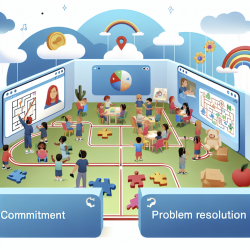Impact on Voice and Respiratory Function
The research highlights that COVID-19 can lead to significant voice issues such as dysphonia, which affects a notable percentage of patients. Practitioners should be aware of the potential for long-term changes in respiratory function and vocal fold damage due to the virus.
- Monitor clients for signs of dysphonia, particularly those who have recovered from COVID-19.
- Implement voice therapy techniques that focus on strengthening the vocal folds and respiratory muscles.
Aerosol and Droplet Transmission
COVID-19 transmission through aerosols and droplets is a significant concern for singers and wind instrument players. The research suggests several mitigation strategies to reduce the risk of transmission.
- Encourage virtual rehearsals and performances to minimize in-person contact.
- Promote the use of masks and instrument covers during in-person sessions.
- Advocate for shorter rehearsals and excellent ventilation in practice spaces.
Psychosocial Impact
The pandemic has also led to increased psychological stress, which can negatively affect the voice. Practitioners should consider the mental health of their clients and incorporate stress-relief activities into their therapy sessions.
- Introduce relaxation techniques and mindfulness exercises to reduce stress.
- Encourage regular routines that include safe singing practices at home.
Telemedicine and Remote Therapy
The shift to telemedicine has proven effective for many voice therapy sessions. The research supports the viability of telemedicine as a long-term solution for providing continuous care.
- Utilize telemedicine platforms to conduct voice therapy sessions, ensuring clients have the necessary technology.
- Provide clear instructions and demonstrations for exercises that can be performed remotely.
Returning to Singing and Instrument Playing
As musicians return to their practices, it's crucial to follow guidelines to ensure safety. The research provides detailed recommendations for safely resuming singing and instrument playing.
- Follow social distancing guidelines and consider outdoor rehearsals when possible.
- Use personal protective equipment (PPE) and ensure proper hygiene practices.
- Stay informed about the latest guidelines and recommendations from health authorities.
By implementing these strategies, practitioners can enhance their skills and provide better support to their clients, helping them navigate the challenges posed by COVID-19.
To read the original research paper, please follow this link: COVID-19: Impact on the Musician and Returning to Singing; A Literature Review.










